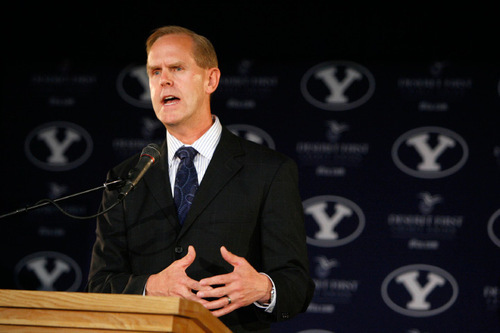This is an archived article that was published on sltrib.com in 2010, and information in the article may be outdated. It is provided only for personal research purposes and may not be reprinted.
To say that BYU's split from the Mountain West Conference has been a long time coming would be an understatement. To say that it was driven by television would be a simple statement of fact.
The man who helped negotiate the MWC's TV contract, Real Salt Lake owner David Checketts, said the current owners of The Mtn., Comcast and CBS, "didn't live up to any of the promises they made to BYU. ... In my view, they couldn't have messed this up any worse."
If you're looking for when things went wrong, look no further than the second week of September 2006. BYU Broadcasting was planning to replay the football team's 49-24 win over Tulsa when word came that Comcast — the operating partner of The Mtn. — was threatening legal action if that happened.
"Basically, we had the understanding that we'd be having what we have (beginning in 2011) with ESPN," said BYU athletic director Tom Holmoe. Games not telecast by The Mtn. would be available for BYUTV. And BYU would be able to rebroadcast games.
Checketts said Comcast did, indeed, promise BYU those rights.
"I was in the room when they told them this, but they didn't want to put it in writing," he said.
"And that is not how it turned out," Holmoe said.
The MWC's TV contract turned out to be something quite different from what was announced on Aug. 26, 2004. Checketts had been asked by the presidents of BYU and Utah to try to find an alternative to the deal ESPN was offering — less money, Tuesday- and Wednesday-night football games, and no Saturday games on TV.
The result was a six-year, $82 million contract with CSTV. Checketts folded his SportsWest Communications into CSTV, and the plan was to have a national presence on that network, along with launching the regional network that became The Mtn.
"It seemed like a good idea at the time," Checketts said. "It was in the execution where CSTV really fell down."
"That period of time was so turbulent, so quick," Holmoe said. "And the next thing you know, we went from having this national stage to a regional sports network."
A small regional network at that. When it launched in 2006, The Mtn. was available in fewer than a million homes. More importantly, its ownership had changed.
In 2005, founder Brian Bedol agreed to sell CSTV to CBS. Checketts was gone; Bedol had to answer to CBS.
In 2006, Comcast came in as a 50 percent owner and operating partner of The Mtn. And, in 2008, CSTV — renamed CBS College Sports — was folded into CBS Sports.
"They sold the regional rights to Comcast, and Comcast decided to make this a way to build cable distribution in all of the Mountain West Conference markets," Checketts said. "That's where the biggest mistake was made.
"Then it just got to be mistake after mistake. And the worst thing they did was the way they treated BYU."
Behind the scenes, BYU officials have been trying to get what they were promised since The Mtn. launched. Later in 2006, Checketts arranged a meeting in New York between CBS and Comcast executives and BYU's top athletic adminstration, including university President Cecil O. Samuelson.
"President Samuelson made just an impassioned plea [for them] to live up to the promises they'd made to BYU once upon a time. And he was assured that they were going to do it," Checketts said. "They apologized to him."
But a few months later, CBS C's Tony Petitti left to run The Baseball Network. "And the Comcast guy just didn't live up to one thing that he said he'd do," Checketts said.
"We fought it and fought it and fought it," Holmoe said. "Those are things that were not delineated early on in the contract. That was one of the issues that we squabbled about for years and years."
Mountain West Conference commissioner Craig Thompson declined to comment for this story. A spokesman said the league preferred to focus on its membership going forward.
A big part of BYU's frustration was that The Mtn. couldn't gain traction nationally. No one involved seemed to understand how difficult it would be to gain distribution.
"Including me," Holmoe said.
Today, The Mtn. is in about 8.5 million homes, compared with 55 million for BYUTV and nearly 100 million for ESPN and ESPN2. And Comcast's refusal to allow BYU to telecast games on BYUTV remains a sore point.
"Our Fresno State basketball game last week wasn't on TV," Holmoe said. "They chose not to do it and didn't allow us to do it. We could have shown it live on BYUTV."
The Mtn. has relaxed it policies a bit this season. It's allowing an Albuquerque, N.M., station to televise several New Mexico basketball games, and spokesman Hayne Ellis said KBYU could have carried the BYU-Fresno State game. But not BYUTV, which has those 55 million homes.
"Our goal is to ultimately expand the distribution for the network. And parceling off what you've already paid the rights fees for is not really conducive to doing that," Ellis said. "You don't want to work against yourself."
But BYU felt like it wasn't ever going to get what had been promised.
"This was a partnership we were hoping would work out. We were hoping we would get to the point where we could do live broadcasts," Holmoe said. "What they ended up always falling back on is, 'We don't have the distribution to allow you to do that.' Well, in reality, would they ever have had the distribution? That's what it came down to."
And Checketts said it was more like BYU and Utah were forced out of the MWC.
"I'm not critical of the schools at all, I'm critical of the conference and the television partners," he said. "They had a great opportunity that they completely blew."





